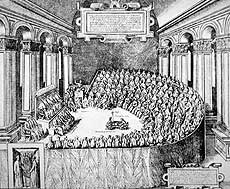Palestrina: The "Savior of Music"?
 In addition to The Peaceable Kingdom, Chorale will sing Palestrina’s Pope Marcellus Mass on our June 10 concert. The latter work was composed in honor of Pope Marcellus II, who reigned for only three weeks, in 1555; Palestrina is likely to have composed it in 1562, a couple of popes later. It is undoubtedly the most famous of Palestrina’s choral compositions, both for its undeniable beauty, and for a persistent legend which grew up around its composition.
The Council of Trent (1545-63) was convened in response to the Protestant Reformation, to bolster church orthodoxy and eliminate internal abuses. The nature and uses of church music were an important topic of this council, especially of the third and closing sessions (1562-63). Two issues in particular concerned the participants: first, the utilization of music from objectionable sources, such as secular songs fitted with religious texts, and masses based upon songs with lyrics about drinking and sex; and second, the
In addition to The Peaceable Kingdom, Chorale will sing Palestrina’s Pope Marcellus Mass on our June 10 concert. The latter work was composed in honor of Pope Marcellus II, who reigned for only three weeks, in 1555; Palestrina is likely to have composed it in 1562, a couple of popes later. It is undoubtedly the most famous of Palestrina’s choral compositions, both for its undeniable beauty, and for a persistent legend which grew up around its composition.
The Council of Trent (1545-63) was convened in response to the Protestant Reformation, to bolster church orthodoxy and eliminate internal abuses. The nature and uses of church music were an important topic of this council, especially of the third and closing sessions (1562-63). Two issues in particular concerned the participants: first, the utilization of music from objectionable sources, such as secular songs fitted with religious texts, and masses based upon songs with lyrics about drinking and sex; and second, the  increasingly elaborate, complex polyphonic texture of the contemporary church music, popular with contemporary composers, which tended to obscure the words of the mass and sacred hymns, interfering with worshipers’ religious devotion. Some sterner members of the Council argued that only plainsong (a single line of music) should be allowed, and polyphony banned altogether. On September 10, 1562, the Council issued a Canon declaring that “nothing profane be intermingled [with] hymns and divine praises,” and banishing “all music that contains, whether in singing or in the organ playing, things that are lascivious or impure.”
increasingly elaborate, complex polyphonic texture of the contemporary church music, popular with contemporary composers, which tended to obscure the words of the mass and sacred hymns, interfering with worshipers’ religious devotion. Some sterner members of the Council argued that only plainsong (a single line of music) should be allowed, and polyphony banned altogether. On September 10, 1562, the Council issued a Canon declaring that “nothing profane be intermingled [with] hymns and divine praises,” and banishing “all music that contains, whether in singing or in the organ playing, things that are lascivious or impure.”
 Palestrina was a brilliant practitioner of polyphonic composition; but his career depended completely on church patronage. When Marcellus II died in 1555, his successor, Paul IV, immediately dismissed Palestrina from papal employment, and hard times ensued for him. Fortunately for Palestrina, Paul IV's death, just four years later, ushered in the era of Pius IV, who was more sympathetic to polyphony. In 1564, according to the legend (and two years after the actual copying of the Mass), Pius asked Palestrina to compose a polyphonic mass that would be free of all “impurities” and would thus silence the purists. Palestrina answered with the Pope Marcellus Mass, and its performance succeeded in establishing polyphonic music (and Palestrina) as the voice of the Church. Palestrina gave the Council what it wanted: clean, singable lines that allowed for clear declamation (and comprehension) of the text; and a smooth, seemingly uncomplicated, harmonically consonant vehicle for the sacred words. The Council participants were appeased, and church music was saved (or so the story goes); composers were allowed to continue to write polyphonic music.
Palestrina was a brilliant practitioner of polyphonic composition; but his career depended completely on church patronage. When Marcellus II died in 1555, his successor, Paul IV, immediately dismissed Palestrina from papal employment, and hard times ensued for him. Fortunately for Palestrina, Paul IV's death, just four years later, ushered in the era of Pius IV, who was more sympathetic to polyphony. In 1564, according to the legend (and two years after the actual copying of the Mass), Pius asked Palestrina to compose a polyphonic mass that would be free of all “impurities” and would thus silence the purists. Palestrina answered with the Pope Marcellus Mass, and its performance succeeded in establishing polyphonic music (and Palestrina) as the voice of the Church. Palestrina gave the Council what it wanted: clean, singable lines that allowed for clear declamation (and comprehension) of the text; and a smooth, seemingly uncomplicated, harmonically consonant vehicle for the sacred words. The Council participants were appeased, and church music was saved (or so the story goes); composers were allowed to continue to write polyphonic music.
It seems unlikely that the Pope Marcellus Mass was composed with the intent of saving music, or even that Palestrina’s name, career, and music came up in the Council’s discussions. No documentation exists to support such a role for him. Most likely, he was a career church musician who was willing to make a few minor adjustments to fit certain requirements because it was the sensible thing to do. Nonetheless, beginning almost immediately in 1564, Palestrina became “the savior of music,” and remained so through the later twentieth century. The Roman Catholic Church presented his compositional style as a model for good church music, and generations of music students studied his works, particularly this mass, as an example of what they should understand and emulate. Giuseppe Verdi said of the composer, “He is the real king of sacred music, and the Eternal Father of Italian music.” In James Joyce and the Making of Ulysses (1934), Joyce's friend Frank Budgen quotes him as saying "that in writing this Mass, Palestrina saved music for the church." Palestrina’s magisterial image was set in stone.
Chorale is finding the Pope Marcellus Mass to be a very rewarding project. The music is lovely, soothing, uplifting; it flows so naturally and effortlessly, one would imagine its composition to have been easy for the composer. The more deeply we delve into it, however, the more we discover Palestrina’s craft and skill, and the genius of his contrapuntal writing. I discover, myself, a similarity to Mozart’s music: a gracious, pleasing, untroubled surface, a kind of abstract perfection: but so difficult to describe and define, once one is inside it. It demands extraordinary skill and grace in performance; and yields, on its own, incredible richness and satisfaction. Palestrina, like Mozart, does not require our help; he requires our humility, our willingness to get out of the music’s way and let it speak for itself.
